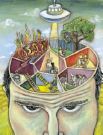The Psychodynamic Approach

The term psychodynamic denotes the active forces within the personality that motivate behaviour, and the inner causes of behaviour. While Freud's was the original psychodynamic theory, the approach includes all those theories based on his ideas.
Read the newspaper article 'The Father of Psychoanalysis' and answer the following questions.
Introduction to psychodynamic psychology
1) Historical and Cultural Contexts.
In order to fully understand Freud's theories you first need to have an appreciation of the era in which he was writing.
Read Pages 204- 206 in Approaches to Psychology.
For this task you will need to get into groups to prepare and present a presentation to the rest of the group on one of the following topics:
- 19th Century Victorian Society
- 20th Century events 1900-1945
- Vienna in the late 19th and 20th centuries
- Science in the late 19th and 20th centuries
- Freud's family background, education and major life experiences
Information on Freud can be found at one of the Freud museum pages:
London
Vienna
Freud Exhibition
Freud, his theories and life in Vienna
General information about his life and the influence of other people can be found at this link.
Essay- At this point in the year you are not ready to attempt a full IB question, such as, describe the historical and cultural context of the development of the psychodynamic perspective. Instead I would like you to write a 350-400 word essay:
Essay: Discuss the historical and cultural context of Freud's theories of behaviour.
2) Frued's Theories- Read pages 206- 233 in Approaches to Psychology
Pages 206-207 Notes on Psychic determinism
Pages 207-209 Notes on Freud's theory of consciousness
(Students to prepare comparison table)
Pages 209-210 Notes on dreams
(Fun dream analysis)
Pages 211-212 Notes on instinctive unconscious drives
Pages 213-214 Notes on the tripartite theory of personality
(Pictorial representation of the mind and personality)
Pages 214-223 Notes on the 5 psychosexual stages of development
See the PPT presentation
Pages 223-228 Notes on defence mechanisms and Link 1, Link 2, Link 3
Pages 229-233 Freud's methods of investigation
Psychoanalytic Theories Overview Powerpoint
3) Freud Video (The Young Dr Freud)
Techniques forResearch
Freud used the case study method when treating his clients (seeing them individually and investigating them in detail) often using the clinical interview method to probe their past and question their behaviour.
See The Little Hans Case Study and others
Answer these questions on the Little Hans case study handed out to you.
Free Association
Dream Interpretation
Freudian Slips
Using these web sites and pages 229-233 in Approaches to Psychology you need to complete a table of all of Freud's methods of investigation. You need to describe each method, give an example of when this was used (if applicable) and detail the strengths and weaknesses of each method.
A) Outline one or more techniques used for research in psychodynamic psychology (6)
B) Evaluate the techniques outlined in question A (14)
Evaluation of Freud
Using a variety of sources you need to name and explain a range of strengths and weaknesses of the Psychodynamic theory- these can be general evaluative points, methological issues, clinical validation of concepts, experimental validation of concepts etc.
Sources:
Glassman Pages 233-238
Empirical Research
Psychoanalysis Effectiveness
Relevance of Freud today
Essay
Describe and evaluate the structure and functioning of the persoanlity in Freudian psychoanalytic theory (20).
The Neo-Freudians
 There are a number of other Psychodynamic theories other than that of Freud. These are collectively known as the Neo-Freudians:
There are a number of other Psychodynamic theories other than that of Freud. These are collectively known as the Neo-Freudians:Jung
Erikson
Klein
Adler
Horney
You will get into groups and prepare a presentation on one of the neo-Freudians. This will be assessed- see the presentation rubric
Essay:
a) Outline two neo-Freudian theories (3)
b) Explain how these theories modify classic psychoanaytic theories (3)
c) Evaluate the contribution of one of the neo-Freudians theores to the understanding of
human behaviour (14)
What do you know about Freud
Take this not so serious quiz to find out.
How can this approach be applied to everyday living?
Read this article published in Psychology Today- Think Like a Shrink


